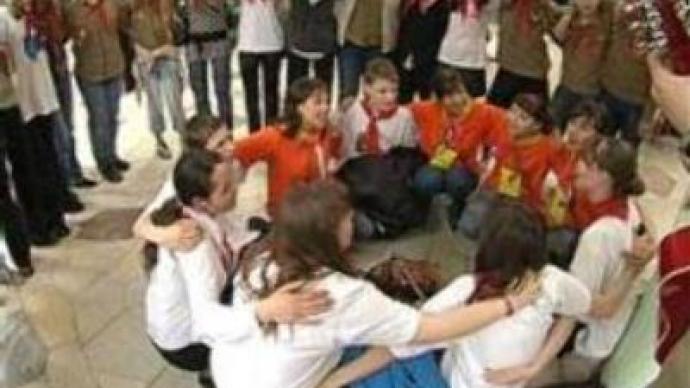Young Pioneer Organisation turns 85

May 19 marks the 85th anniversary of the Young Pioneers' organisation. The youth movement started from several small groups in the early 1920s and went on to have 25 MLN members by the time the Soviet Union collapsed.
Even though some still associate themselves with communism, most pioneers now insist they are part of a youth organisation without political links. As Pioneer Day approached, many travelled to Moscow from across Russia and Belarus for a reunion. Despite being one organisation, every regional one has its own peculiarities, even different tie colours. Dmitry Lebedev, Leader of Moscow Pioneers and a historian, says, “The children who gathered here say they want to be united and they have so much in common. But our main problem is that we don't have one single centre. And creating such a centre is impossible now. We don't have huge financial resources and don't want to depend on any party to provide us with those resources”. There are some 5 MLN pioneers in Russia with only 1,500 in Moscow and just a few schools support them. But despite the different ties around their necks, their goals are the same.“We help veterans, plant trees in parks. And even though we have different ties, we have the same pioneer rules, songs and slogans,” Svetlana Kiseleva, a pioneer, says. “We develop our talents and study a lot. We also attend orphanages ,” adds Tatiana Stepanova adds.The delegation from Belarus, where the pioneers’ organisation is still very strong, brought fresh ideas and a willingness to stay close to Russia.Belarusian pioneer Anton Golovan explains, “The goal of the Pioneer Organisation of Belarus is to help every pioneer become a worthy citizen of his or her Republic. A patriotic upbringing is a very important matter for every country. So that's why the Belarusian Pioneer Organization will live on”. Moscow is the cradle of the movement. On May 19, 1922, the second all-Russia Conference of the Soviet Youth issued a decree to use Moscow's experience of organising children, to create pioneer groups all over the country. The authorities of the newly formed Soviet Republic had many problems to solve. Many of the children had no parents, were starving, homeless, illiterate and had turned to stealing. Historians say the first pioneers had a lot in common with boy-scouts and some of those who started the organisation were scout masters. They brought many traditions and symbols from scouting, including the name “pioneers”, which is one of the levels in the scout movement. “The word ”pioneer“ exists in the Russian language, unlike the word ”scout“. It was easily accepted and, strangely enough, never confused with American pioneers, who explored the West and even wore ties as protection from sand and dust,” says Dmitry Lebedev. However, scouts are not the only ones who influenced young pioneers. Before and after the Revolution of 1917 there were many other children's organisations. Their experience helped in the formation of the new movement. In the 1930s, the Pioneer organisation underwent a serious transformation. The government, trying to unite all the educational systems, made it a compulsory part of schooling. This allowed it to grow into the largest children's organisation, which by the end of the 1960s numbered 25 MLN people.Its sheer size, including almost all school children in the USSR, created other problems- there were not enough people with the skills to maintain it properly. And even though no one officially banned the pioneers, after the collapse of the Soviet Union they almost seized to exist. Lilia Kuznetsova, a former pioneer leader, says “It's really sad we don't have that organisation any more. Of course it had many problems, but also there were so much that was useful and interesting. Otherwise there wouldn't be as many people who remember their happy pioneer childhood with the gratitude and joy”.
You can share this story on social media:












